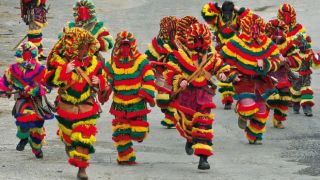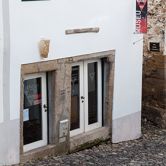Carnival of Podence, World Heritage

The ancient Carnival held in the village of Podence is one of the most important traditional events of northern Portugal. The strong participation of the local community that has managed to preserve this tradition for centuries and its current importance in the region's cultural events were crucial factors for UNESCO to classify the Carnival of Podence as Intangible World Heritage.
During Carnival, the “devilish” figures of the Caretos - boys wearing masks and costumes with colourful fringes, the masks are made of tin or leather and have pointed noses; rattles are attached around the waist. They roam the streets of Podence making lots of noise to disturb the usual peace and quiet of the village.
Originally the Caretos were linked with the figure of the “devil on the loose” and represented the excesses, euphoria and joy allowed at this time of year, after the cold winter months, while also celebrating the fertility of the approaching spring.
The tradition still continues today: from Domingo Gordo ("Fat Sunday") to Shrove Tuesday, the village boys personify the mysterious characters and, full of energy that they believe is transmitted by the mask, they run around the village jumping and shouting. One of the main reasons for this running around is to find girls to dance with and “rattle” them. And so they have a great time, protected by anonymity. The group also includes children dressed as caretos, known as facanitos, who follow and copy their elders, learning from them and ensuring the continuity of the Entrudo Chocalheiro ("rattling carnival").
Among the most important moments of the Carnival of Podence, we must mention the fictitious weddings, on the Sunday, a fun event when the people chosen have no chance to complain and, on Shrove Tuesday, the parade through the village and the Queima do Entrudo ("burning the wicker man"), which signals the end of the festival.
In 1985, the Podence Caretos got organized and turned the group into a cultural association whose main goal was to preserve this traditional event. As a symbol of Northeastern Trás -os-Montes culture, these masked performers have been invited to take part in various cultural and recreational events. To find out more about the group and history of this tradition, you can visit the Casa do Careto, a museum in Podence.








 Explore
Explore 
 Remember and Share
Remember and Share 


